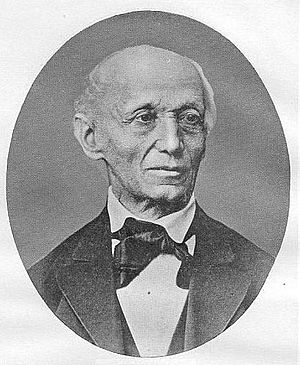Eduard Zeller facts for kids
Eduard Gottlob Zeller (born January 22, 1814, in Kleinbottwar, Germany; died March 19, 1908, in Stuttgart) was a German philosopher and a Protestant religious scholar. He was very famous for his writings about Ancient Greek philosophy. His most well-known work was a large history book called The Philosophy of Greeks in their Historical Development. Zeller also helped bring back a way of thinking called neo-Kantianism.
Life of Eduard Zeller
Eduard Zeller was born in a small town called Kleinbottwar. His father worked for the government. Eduard first studied at special schools in Maulbronn and Blaubeuren starting in 1831. Later, he went to the University of Tübingen. This university was greatly influenced by the philosopher Georg Wilhelm Friedrich Hegel at the time.
In 1836, Zeller earned his doctorate degree. His main paper was about Plato's book, Laws. By 1840, he was teaching theology at Tübingen. In 1847, he became a professor of theology in Berne, and in 1849, in Marburg. At Marburg, he soon changed from teaching theology to teaching philosophy. This happened because of some disagreements with religious groups.
He became a philosophy professor at the University of Heidelberg in 1862. Then, he moved to Berlin in 1872. He stopped working around 1895. His book, The Philosophy of Greeks in their Historical Development, remained his most famous work. He kept making this book better with new research. The last version came out in 1902. This book was translated into many languages. It became the main textbook for learning about Greek philosophy.
Zeller also wrote many books on religion. He also published three books of philosophical essays. He helped start a magazine called Theologische Jahrbücher. This magazine became known for its historical way of studying things. Like many thinkers of his time, he started by following Hegel's ideas. But later, he developed his own system of thought. He felt it was important to go back to Immanuel Kant's ideas. He wanted to look closely at how we gain knowledge.
Eduard Zeller's Ideas
Zeller's work on the history of philosophy was much more important than his own new ideas. His understanding of Greek thought was shaped by Hegel's ideas. Some people say Zeller did not pay enough attention to the culture of the time. They also say he missed some unique traits of individual thinkers.
However, his history of Ancient Greek philosophy was still very important and respected. He received high honors from philosophers and learned groups worldwide. The German Emperor Wilhelm II gave him a special title in 1894. His statue was even placed near the Brandenburg Gate in Berlin.
Zeller's main book, Philosophie der Griechen, was translated into English. It was published in different parts. For example, there were books like History of Greek Philosophy to the time of Socrates and Socrates and the Socratic Schools. Other parts covered Plato, Aristotle, and other ancient thinkers.
In his book, Philosophie der Griechen, Zeller was one of the first to use the word 'Superhuman' (übermensch). He used it as a special term in philosophy. He said that happiness from certain things could be "superhuman." In contrast, happiness from good actions was just a normal human good.
Works by Eduard Zeller
His big book, The Philosophy of Greeks, also came out in a shorter version. This shorter book was called Outlines of the History of Greek Philosophy in English.
Here are some of his other important works:
- Platonische Studien (1839)
- Die Apostelgeschichte kritisch untersucht (1854)
- Entwickelung des Monotheismus bei den Griechen (1862)
- Strauss und Renan (1864)
- Geschichte der christlichen Kirche (1898)
- Geschichte der deutschen Philosophie seit Leibniz (1873)
- Staat und Kirche (1873)
- Strauss in seinen Leben und Schriften (1874)
- Über Bedeutung und Aufgabe der Erkenntnisstheorie (1862)
- Über teleologische und mechanische Naturerklärung (1876)
- Vorträge und Abhandlungen (1865–84)
- Religion und Philosophie bei den Römern (1866)
- Philosophische Aufsätze (1887)
See also
 In Spanish: Eduard Zeller para niños
In Spanish: Eduard Zeller para niños
- Wilhelm Nestle


